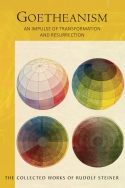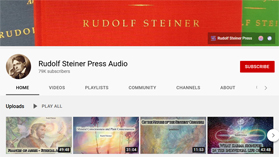
-
GOETHEANISM
An Impulse of Transformation and Resurrection
Rudolf Steiner

‘There will be a resurrection – a resurrection that should not be imagined politically… but it will be a resurrection. Goetheanism still rests in the grave as far as external culture is concerned. But Goetheanism must rise again.’
In the first winter following the Great War, Rudolf Steiner appealed to the spirit of Central Europe – which he characterized as Goetheanism – that had been languishing for decades. Only such a spiritual force could provide answers to the pressing social, national and international questions of the time. A new constellation of polar, hostile opposition had emerged after the war, with the East and Bolshevism on one side, and the victorious West and Americanism on the other. In the middle, with no apparent role or hope for the future, was the defeated Central Europe. But this ‘centre’, beseeched Steiner, should not become a vacuum. Rather, it needs to discover its true, world-historical task.
In this context, with deep seriousness and urgency, Rudolf Steiner speaks of the work of Goetheanism, which begins with understanding the threefold human being and leads to threefolding the social organism. Steiner goes on to describe the decisive role of the consciousness soul in the present epoch, and how Schiller’s Aesthetic Letters and Goethe’s Fairy Tale relate to contemporary challenges. He discusses a multitude of seemingly diverse but interrelated themes, such as the migration of peoples in the past and present, the thinking of John of the Cross, and the modern path of spirit cognition. The first English publication of these lectures features an introduction by Christian von Arnim, notes and an index.
28 October 2024; Trans. with Intro. by C. von Arnim (Twelve lectures, Dornach, Jan.–Feb. 1919, GA 188); RSP; 280pp; 23.5 x 15.5 cm; pb;
£20.00 ISBN 9781855846678

